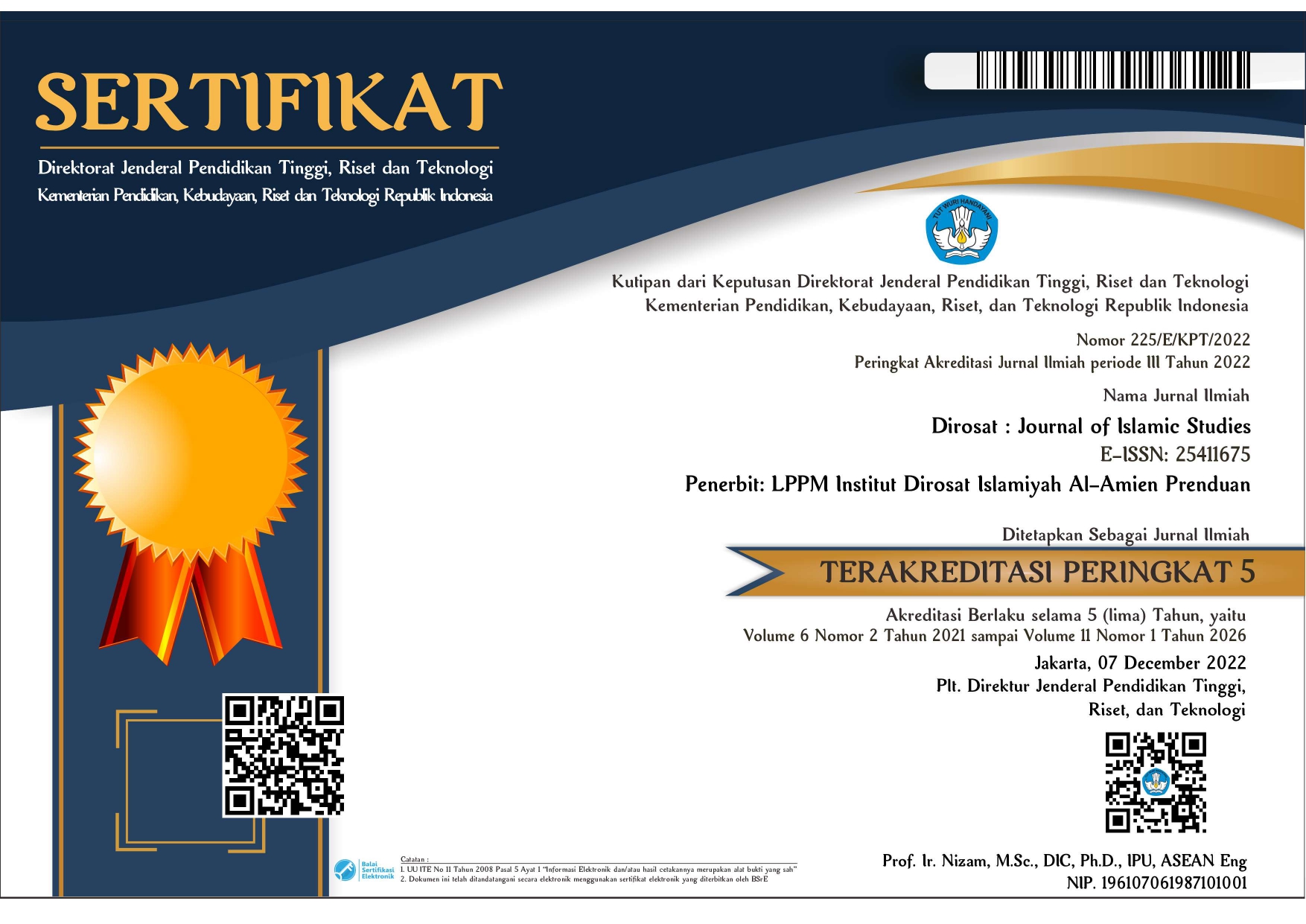IMPLEMENTASI TADARRUS MUWAJJAH DALAM MENINGKATKAN BACA AL-QUR’AN MAHASISWI INTENSIF
Abstract
Keywords
References
Abdullah, M. (2014). Ulumul Qur’an. Pustaka Belajar.
Ahmad, B., & Laha, M. S. (2020). Implementation of Field Studies to Improve Problem Analysis Ability (Case Study in the Student Sociology IISIP YAPIS BIAK). Jurnal Nalar Pendidikan, 8(1). https://doi.org/https://doi.org/10.26858/jnp.v8i1.13644
Ashadiqi, M. H. (2020). Aplikasi Pembelajaran Ilmu Tajwid Berbasis Android. Jurnal Rekursif, 8(1). https://doi.org/https://doi.org/10.33369/rekursif.v8i1.9641
Bafadhol, I. (2017). Lembaga Pendidikan Islam di Indonesia. Edukasi Islami : Jurnal Pendidikan Islam, 06(11). https://doi.org/http://dx.doi.org/10.30868/ei.v6i11.95 ? CITATIONS ? total citations on Dimensions.
Fitri, I., & Wahyudi, H. F. (2021). Prokrastinasi Belajar Mahasantri di Lingkungan Kampus Institut Dirosat Islamiyah Al-Amien Prenduan. MUKADIMAH: Jurnal Pendidikan, Sejarah, Dan Ilmu-Ilmu Sosial, 5(1).
Fitriani, D. I., & Hayati, F. (2020). Penerapan Metode Tahsin untuk Meningkatkan Kemampuan Membaca Al-Qur’an Siswa Sekolah Menengah Atas. Jurnal Pendidikan Islam Indonesia, 5(1).
Hariandi, A. (2019). Strategi Guru dalam Meningkatkan Keterampilan Membaca Alquran Siswa di SDIT Aulia Batanghari. Jurnal Gentala Pendidikan Dasar, 4(1). https://doi.org/https://doi.org/10.22437/gentala.v4i1.6906
Indriastuti, A., & Sutaryadi, dan S. (2017). Pengaruh Kesiapan Belajar Siswa dan Keterampilan Mengajar Guru terhadap Hasil Belajar. Jurnal Informasi Dan Komunikasi Administrasi Perkantoran, 1(1).
Jamhuri, M. (2016). Penggunaan Metode Drill dalam Meningkatkan Kemampuan Membaca Al-Qur’an Siswa di SMK Dewantoro Purwosari. Jurnal Al-Murabbi, 1(2). https://doi.org/https://doi.org/10.35891/amb.v1i2.395
Junaedi, I. (2019). Proses Pembelajaran yang Efektif. JISAMAR (Journal of Information System, Applied, Management, Accounting and Researh, 3(2).
Michael, Miles Matthew B, Huberman A., S. J. (2014). Qualitative Data Analysis. SAGE.
Nurhayati, T., Nurunnisa, E. C., & Husni, H. (2018). Upaya Meningkatkan Kemampuan Membaca Al-Qur’an Anak Usia Dini melalui Penerapan Metode Iqra’ (Penelitian Tindakan Kelas di Raudhatul Athfal Daarul Hikmah Kecamatan Cijeungjing Kabupaten Ciamis). Tarbiyat Al-Aulad: Jurnal Pendidikan Islam Anak Usia Dini, 3(1). https://riset-iaid.net/index.php/TA/article/view/123
Reski, D. J., & Ilyas, A. (2019). Konsep Kesiapan Siswa dalam Mengerjakan Tugas. SCHOULID: Indonesian Journal of School Counseling, 4(1).
Sidik, Z., & Sobandi, A. (2018). Upaya Meningkatkan Motivasi Belajar Siswa melalui Kemampuan Komuniasi Interpersonal Guru. Jurnal Pendidikan Manajemen Perkantoran, 3(2).
Sirait, E. D. (2016). Pengaruh Minat BelajarTerhadap Prestasi Belajar Matematika. Jurnal Formatif: Jurnal Ilmiah Pendidikan MIPA, 6(1). https://doi.org/http://dx.doi.org/10.30998/formatif.v6i1.750
Sugiyono. (2019). Metode Penelitian Kuantitatif Kualitatif dan R&D (Sutopo (ed.); Cetakan ke). Alfabeta.
Syarifuddin, A. (2008). Mendidik Anak Membaca, Menulis, dan Mencintai Al-Qur’an. Gema Insani Press.
Tim redaktural Warkat, A.-A. P. (2021). Warkat 2021.
W, D. I. (2017). Peran Jam Belajar Efektif Siswa di Sekolah dalam Memoderatori Motivasi dalam Meningkatkan Hasil Belajar Siswa. Scholaria : Jurnal Pendidikan Dan Kebudayaan, 7(1).
Yakin, A. (2018). Spiritualitas dalam Pendidikan Islam Perspektif Muhammad Naquib Al-Attas. MAHAROT: Journal of Islamic Education, 2(2).
Zainuddin. (2019). Peningkatan Efektivitas Guru dalam Pengelolaan Waktu Belajar Siswa di SMP Binaan Kota Lhokseumawe dengan Menggunakan Ceklis Siswa pada Tahun 2019. Serambi Akademica: Jurnal Pendidikan, Sains, Dan Humaniora, 7(4).
Zarkasyi, I. (2014). Pelajaran Tajwid: Vol. XVII. TRIMUTRI PRESS Gontor Ponorogo.
DOI: 10.28944/dirosat.v7i2.969
Refbacks
- There are currently no refbacks.

This work is licensed under a Creative Commons Attribution-NonCommercial-ShareAlike 4.0 International License.








